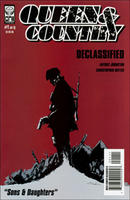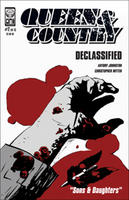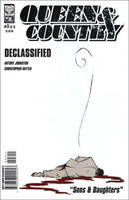 I really think Antony Johnston and Christopher Mitten did a good job. I liked it but I’m not gushing over it and I hate to sound like I don’t like something when I actually do like it. In short, this is a very enjoyable story but I don’t exactly know why. Hence the essay as attempt to understand.
I really think Antony Johnston and Christopher Mitten did a good job. I liked it but I’m not gushing over it and I hate to sound like I don’t like something when I actually do like it. In short, this is a very enjoyable story but I don’t exactly know why. Hence the essay as attempt to understand.I’ve always thought I would like stories involving the IRA but I don’t ever seem to read or watch many. To me, it seems these types of stories either gloss over the causes of the IRA or they get bogged down by the politics of Northern Ireland. I liked The Crying Game, In the Name of the Father, and Patriot Games but I haven’t really found a story that seemed to hit the right notes for me to gush over it. I likes me some action flicks like any red-blooded male but the use of the IRA seems almost dismissive of the complex situation. On the other hand I don’t like being preached to. I think all history, including recent history, is open to artistic interpretation don’t get me wrong on that. It’s just that IRA stories tend to be akin to how Arabs are being used today. Either things are over explained or glossed over depending on the needs of the story. I rarely, if ever, see the setting used in a way that reflects or enhances the themes of a story. Maybe in The Crying Game, but I haven’t seen that movie in a long time so I can’t remember exactly.
Then I found this story. It tells stories the way I like them told. It shoves you into the middle of it and assumes you can figure out what’s going on. It doesn’t treat the reader like a complete tit or beat you over the head with history, revisionist history or minutiae and the appearance of fairness. This story comes at you from two sides and doesn’t apologize for it, over explain it or really gloss over it too much in the way an action movie explores the motivation of a “bad guy” (or doesn’t explore the motivation other than a simple “he’s a terrorist who wants money” or “the hero killed his brother/sister/mother/father/lover/etc).
A balance is found between two survivors of one violent event – Liam Finnegan and Lauren Mullen. On one side we see the kidnapper and on the other the kidnapped girl/woman. Both of them come out of the same event with extremely different points of view. They aren’t completely opposing points of view but they are extremely different. Both Liam and Lauren want an Ireland that is determining its own future. It is the methods they resort to that differentiate them. Liam shows what happens when you enter into a violent lifestyle. When you are so desperate that you need to resort to extreme violence it is next to impossible to remove yourself from it again. It will eat up your entire life as is shown by Liam in this story. His lifestyle is used to show us how he can’t escape yet he is unbelievably clever when he re-enters this life. Upon rejoining the active IRA he enters it from outside the group and can see they’re being compromised. His distance from the situation allows him to prove how clever he is in sniffing out spies and killing soldiers. Then there is Lauren who comes out of being kidnapped and having her father killed with a clearer vision that the causes go beyond the appearance of things and that the solution is more than cosmetic, jingoistic and simple. She, of all people, knows the results of desperate acts of violence for freedom and she starts going after the root causes. She talks about paradigm shifts instead of band-aid or black and white solutions.
 Then the character of Poole starts to take over the story. He is a trooper caught up in the middle of the fight. He is in the middle of it because it is his job to be. Poole becomes the balance between Liam and Lauren. He can be clever when he needs to be but brains can’t get you through every scenario and his soldiering proves he is capable of dealing with physical action. He is the victim of a truck bomb at the end of issue 1 and it thrusts him into action during issues 2 and 3. There is a sense of fatality to the actions of Poole. He is the victim of a bomb and is basically decommissioned. Through his boredom he starts to research his father’s death and finds a connection between his last assignment, his father’s death and the other main characters.
Then the character of Poole starts to take over the story. He is a trooper caught up in the middle of the fight. He is in the middle of it because it is his job to be. Poole becomes the balance between Liam and Lauren. He can be clever when he needs to be but brains can’t get you through every scenario and his soldiering proves he is capable of dealing with physical action. He is the victim of a truck bomb at the end of issue 1 and it thrusts him into action during issues 2 and 3. There is a sense of fatality to the actions of Poole. He is the victim of a bomb and is basically decommissioned. Through his boredom he starts to research his father’s death and finds a connection between his last assignment, his father’s death and the other main characters.Although there is a definite personal connection between Poole and Liam it doesn’t cloud Poole’s judgment the way a personal connection clouds Liam’s and drives Liam on a foolishly singular mission. Poole shows the other side of the same situation. Liam is trained to kill but when his personal life gets mixed up into his mission he can’t separate the two. Poole is spurred into action by a personal mission but manages to combine the two in a much more effective manner. Poole is trained to kill but does it to protect someone specific Lauren, whereas Liam is trained to kill and does it for to protect himself. It isn’t his physical self that Liam is protecting but the image of himself that he has created because of his connection to Danny, his brother in arms. Liam is living on his colleague's infamy. Whereas Poole and Lauren are living with their father’s respective shadows the live up to their own expectations. Liam lives completely within his colleague's shadow and is now trying to ensure nobody can find out the truth. Liam is driven by a selfish revenge where Poole is driven to take risks by his feelings of revenge his response is to an immediate threat. Poole doesn’t kill to avenge his father’s death. He kills to save Lauren and possibly saves her desire for a free Northern Ireland.
All the characters are bright people willing to spend time on their causes. They all have a tragic connection to the “troubles” and they are all connected by a shared moment in history. Yet in the end it is how they react to that history that determines the outcome for each character. It isn’t simply a message of reject violence or focus on the future not the past that is presented in this story. Everyone who acknowledges the past but doesn’t confine themselves to repeating it survive this story. They look to the future that will come from their acknowledgement of the past but they don’t ignore the past or get stuck in a feedback loop thereof. Liam traps himself in the past through his actions and his affectations whereas Lauren and Poole use the past to become themselves. That is the biggest difference between the good guys and bad guys here.
 Again, this is a black and white comic which is apparently a regulation for my reviews. Honestly, this is coincidence. After The Walking Dead I really didn’t know what to make of the artwork here. On one end of the black and white scale I use is the characterization and detailed backgrounds of The Walking Dead then the cartoonesque fun of The Amazing Joy Buzzards. This falls somewhere in the middle. I had trouble keeping the soldiers straight but that’s sort of the point with armies; to remove individuality. It was only about halfway through the second book that I realized Mitten was creating a minimalist art here. It hovers between realism and cartoony, and although there are obvious characters from the get go they are presented in a very minimal way.
Again, this is a black and white comic which is apparently a regulation for my reviews. Honestly, this is coincidence. After The Walking Dead I really didn’t know what to make of the artwork here. On one end of the black and white scale I use is the characterization and detailed backgrounds of The Walking Dead then the cartoonesque fun of The Amazing Joy Buzzards. This falls somewhere in the middle. I had trouble keeping the soldiers straight but that’s sort of the point with armies; to remove individuality. It was only about halfway through the second book that I realized Mitten was creating a minimalist art here. It hovers between realism and cartoony, and although there are obvious characters from the get go they are presented in a very minimal way.Sorry for skimping on the art review but I’m still learning how to interpret the play between the art and the story. Plus I don’t have the books in front of me as I’ve written this.
2 comments:
Jon, thanks for taking the time to formulate and write a spot-on analytical piece. It's always gratifying to see someone looking beyond the surface of a story, and what you've come up with here is a pretty accurate reflection of my intentions, subtextually speaking. Thanks :)
(Just one thing, though - Danny isn't Liam's brother. They were colleagues in the Armagh Brigade.)
- Antony
Antony, sorry about my spotty fact checking. This will teach me to write stuff from memory.
Thanks for the post. I'm always happy to see new people reading this, whatever it is.
I'll try to edit this post by Monday since I'm about to go to the movies with my spouse and I limit my time online during the weekends.
Post a Comment